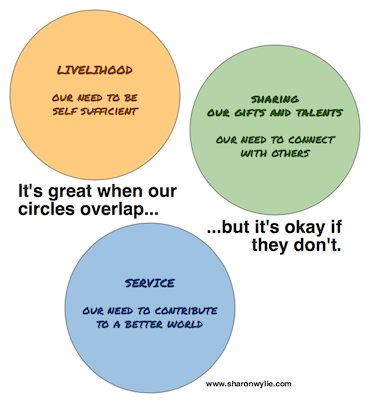Our Jobs Aren’t Everything
Our culture right now is steeped in messages that encourage us to do what we love, and the money will follow. There’s a book by that name–Do What You Love, the Money Will Follow–written in 1989 by Marsha Sinetar, and I don’t know if she and that book started our preoccupation with doing what we love, or if she merely tapped into it at the right moment with the best phrase, but “do what you love” thinking has given us thousands of self-help books to help us find that magical, perfect job that will be so fulfilling, so joyful, that our 43 years of working (that’s the average) won’t feel so much like work.
“Do what you love” thinking can be inspirational if you’ve never thought that work could be rewarding and fulfilling. But I want to suggest that “do what you love” thinking can also be limiting. It may even be harmful.
It is not necessarily true that doing what you love will bring money to pay the bills. And trying to figure out what you love and how you can make a living at it can become a full-time distraction. Most of us don’t have just one passion, one skill set, one thing to spend our lives doing. We’re much too complicated, and our interests are varied.
It can also be possible that doing what you love for money may destroy the thing you love. Imagine writing poetry for a deadline and a publication date. Or being paid more if your poem is longer.
And perhaps most importantly, the story that we should love what we do can become an excuse for tolerating insufficient pay and a poor work environment. Whenever caring professions, like teachers and nurses, negotiate for increased pay and benefits, they meet community resistance because they are supposed to love what they do, not demand fair wages for it.
The truth is, if we all got to do what we love, somebody still needs to pick up the garbage. Somebody needs to work at the sewage treatment plant. It’s the story of the little red hen, right? Somebody needs to harvest the wheat if we’re going to eat cake.
As a society, we have work that needs to be done for us to function together. Work has its place, and we need to recognize that and respect it. As Miya Tokumitsu writes, “Elevating certain types of professions to something worthy of love necessarily denigrates the labor of those who do unglamorous work that keeps society functioning…”
Now, we do have needs that work sometimes meets and sometimes doesn’t. To help us understand the needs were trying to meet, I want to offer this diagram.
The need I think work hopefully meets is our need to be self-sufficient. All the stress that comes from paid work comes because even when we’re making enough money, we can feel powerless about our work conditions, and that undermines our feeling of self-sufficiency. But self-sufficiency is the main need I think work helps us with.
We also have a need, I think, to be of service, to contribute to making the world a better place. We need to volunteer; I believe that. Volunteering combats depression, lowers mortality rates, and contributes to happiness and well-being. So, I don’t mean I think it’s a good idea; I mean…I think we need to contribute time to causes and organizations that are important to us, and the quality of our lives is diminished when we don’t.
And we need to share our gifts and talents with others. Sharing our gifts and talents is how we truly connect to other people. If I’m a writer who only writes for myself and never shows anyone what I’ve written, that’s not enough. We need to share of ourselves. You know I think that church is one of the places that kind of sharing can happen.
Now, of course, it’s possible that these three needs—the need to be self-sufficient, the need to contribute to a better world, and the need to connect with others—it’s possible that these can overlap. Some of us might have circles that overlap completely and are synchronous—I think my work as a minister is like that—but some of us may have circles that never overlap at all.
And what I’m suggesting is that that’s okay.
This post is an excerpt from my sermon on May 31, 2015 at Chalice Unitarian Universalist Congregation.

Leave a Reply